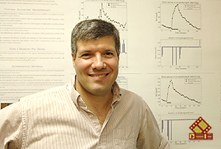Ideas and people behind the Coulter awards
Creating a wearable glucose regulation system for type-one diabetes

Part one of a five-part series.
For Ed Damiano, a College of Engineering associate professor of biomedical engineering, and his wife, Toby Milgrome, a pediatrician at Worcester’s Fallon Clinic, medical research is personal.
A few years ago, the couple learned that their young son, David, was a diabetic. Today they are working to create a wearable automated glucose regulation system for type 1 diabetes, and they are one of five BU research teams to receive a share of the inaugural Coulter Foundation Translational Partnership Award of $580,000.
In November, the Coulter Foundation awarded the College of Engineering department of biomedical engineering a Translational Partnership Award of $2.9 million over five years to help biomedical technologies move from the lab bench to the patient bedside. Department faculty who found a clinical partner for their research were eligible to apply for the grant, and this year 18 teams started the process by submitting preproposals. In this five-part series, BU Today looks at the projects selected for this year’s Coulter awards. Today we report on Damiano’s and Milgrome’s automated glucose regulation system.
An Interview with Coulter Project Director Arthur Rosenthal
The awardees were chosen by BU’s Coulter oversight committee, which includes Arthur Rosenthal, who served as the chief scientific officer of Boston Scientific for 11 years before becoming the University’s Coulter project director in the fall of 2005. BU Today spoke with Rosenthal about what brought him to BU and about research that could change the face of medicine.

BU Today: What led you to BU?
Rosenthal: I became aware of Boston University’s biomedical engineering students by virtue of having hired some for summer jobs and internships, and I was impressed with the quality of the students and wanted to learn more about the curriculum. About four years ago, I attended their senior project day and was very impressed by the students. They were very well trained. And I approached Ken Lutchen [an ENG professor and chairman of biomedical engineering] and said, “This is a wonderful thing, and I’d be happy to get more involved and give these projects even greater connectivity to industry.” So, we formed the Industrial Advisory Committee [IAC] to get some industry folks sitting around the table, to help the industrialization of the senior projects.
Then the IAC evolved, right?
Members of the committee began teaching a couple of segments in the senior projects course. It was team teaching. The IAC members each gave a lecture or two in some areas related to industry — patents, regulatory quality, systems, project planning. Then, a year ago, the course was given official status as a two-credit course, and the IAC continues to expand, adding new members. And when the Coulter opportunity came up, Ken [Lutchen] had the desire to go after it, and I volunteered to be the project manager and helped him put that proposal together. And then we won it, and I’m doing it.
So, how have you found the transition from the top tiers of industry to academia?
As I said, we had exposure to students while I was at Boston Scientific. I’ve always believed in hiring summer students from academic programs. It’s one of the ways you identify high-quality employees. I was inclined to be personally involved to see how things worked at the department of biomedical engineering.
How would you define the purpose and the promise of the Coulter Translational Partnership Award?
Coulter provides the seed funding and the vision that empowers us to get serious about translational research. There’s nothing new about translational research at BU, but the Coulter Foundation grant was something of a galvanizing event that made us pull our thoughts together seriously and allowed us to put in place infrastructure and a system to expand translational research. It was a catalyst. The money and opportunity came together in a manner in which we could take the basic translational research efforts we were establishing here and make it more substantial.
The Coulter award requires a practicing physician and a researcher in biomedical engineering to get together. It is the essence of bringing medical and engineering folks together in a very substantial way to allow projects that have potential clinical value to move ahead. It’s all about taking ideas and putting them into clinical use so they can help people.
Given that this was the first year the Coulter money was up for grabs, how would you assess this first crop of project proposals?
We had 18 preproposals. People had some early ideas, so we wanted to help them develop them. This is a new process for everybody. And out of the 18, we encouraged 14 to present formal proposals. Of those 14, we chose 8 for oversight committee presentation. And from there, we’ve given awards to five projects.
But at the Coulter office, we have an obligation: if you put in a preproposal, the Coulter team will work with you from that point on. If it’s not accepted initially, we have an obligation to get your project to a proposal stage so that you can resubmit it. The whole idea that this is a process is extremely important. It’s a continuous process of translational research that starts in the proposal phase and goes forward. The Coulter team is a resource to support folks in general who have translational ideas and to help them nurture their ideas. Our job is to take translational ideas and to find opportunities for them to be developed.
Visit BU Today tomorrow to read "Shining a new light on cancer." Irving Bigio of ENG and Satish Singh of MED use light to guide the diagnosis and treatment of cancer.